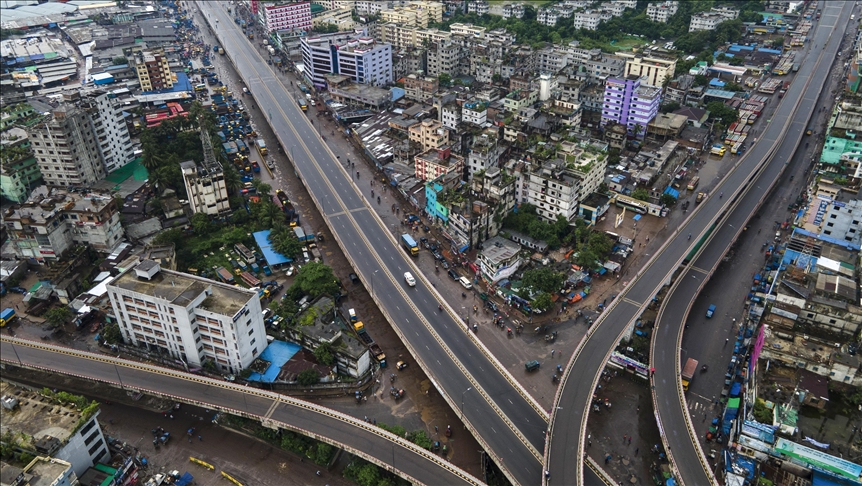Bangladesh's capital reels under burden of haphazard urbanization
Dhaka, megacity of over 21M, is a sprawling mass of residential, commercial areas vulnerable to all sorts of disasters

DHAKA, Bangladesh
Rapid urbanization with faulty infrastructure and poor facilities has turned Bangladesh’s capital Dhaka into one of the world’s riskiest cities, according to experts and residents.
Defective and congested buildings, polluted environment, ceaseless traffic jams, and a shambolic sewerage and waste management system are all evidence of the lack of governance that has gradually turned the megacity of over 21 million people into an uninhabitable place.
“It was once my dream to settle permanently in Dhaka, but the decade I spent working there was a bitter experience that made me rethink my decision,” Jalal Uddin Ahmed, a retired government official who worked at the Bangladesh Rural Development Board, told Anadolu Agency.
Ahmed planned to use his savings and pension to buy either a plot of land or an apartment in Dhaka, but opted against it and is now building a house in his native town of Patharghata in the southern district of Barguna.
He counts himself among the few lucky ones who have been able to avoid Dhaka’s “miserable and stressful” living conditions.
For Mohammed Akhter Hossain, the dangers of life in Dhaka became all too real when a massive fire gutted several buildings near his home in the capital’s old Chawkbazar area in February 2019, killing at least 70 people.
“I have no choice but to live in Dhaka for my work. My family is here with me and I’m always worried for our safety. For me, this part of Dhaka is nothing but a concrete jungle,” he said.
Plethora of problems
Today, Dhaka is a sprawling and largely unplanned mass of residential and commercial areas with thousands of buildings that do not meet any sort of safety and construction standards.
The buildings are vulnerable to a raft of disasters, including fires and earthquakes, and the city’s underdeveloped rescue services do not have the capacity to effectively respond to any such eventuality.
Adding to the challenges is the fact that roads account for just 7% of Dhaka’s area – well below the 25% essential under international standards – and the city has massive traffic jams that hinder any rescue operations.
According to official records, there are around 1.2 million buildings in Dhaka, while a recent survey of 3,500 structures found that 70% were defective and violated construction codes.
Nurul Islam Nazem, an urban policy expert and former professor at Dhaka University, said not a single city in Bangladesh has been developed at par with international standards.
“There is a huge number of unauthorized buildings in Dhaka, which is just one of dozens of the problems plaguing the capital,” Nazem told Anadolu Agency, adding that a major earthquake or any other natural calamity would turn the city into “a pile of destruction.”
“Even our hospitals and schools are in buildings that do not meet safety standards. This is a disaster waiting to happen.”
Bangladesh’s urban areas are also the location of choice for the country’s massive garments industry, with factories and other facilities set up in shoddy buildings that can be death traps.
This was the case in the 2013 Rana Plaza tragedy, when a multistory building being used as a garments factory in Dhaka collapsed and killed more than 1,130 people.
Nazem said authorities in Dhaka do not have the manpower or resources to inspect all buildings and enforce safety rules.
There is also rampant corruption and developers can easily bribe officials to get all necessary approvals to make buildings wherever and however they want, he added.
Vague promises
In a conversation with Anadolu Agency, the head of Dhaka’s main development authority, known as Rajdhani Unnayan Kartripakkha (RAJUK), offered vague promises of efforts to rectify the capital’s numerous shortcomings.
ABM Amin Ullah Noori claimed the authority is pursuing two projects “that will reshape Dhaka.”
“We are currently working on a major project with the World Bank to develop Dhaka and make it a good city,” he said, refusing to divulge details of the initiative.
“We are hopeful that these projects will bring about huge changes and people will see a comparatively better and safer Dhaka.”
Anadolu Agency website contains only a portion of the news stories offered to subscribers in the AA News Broadcasting System (HAS), and in summarized form. Please contact us for subscription options.






